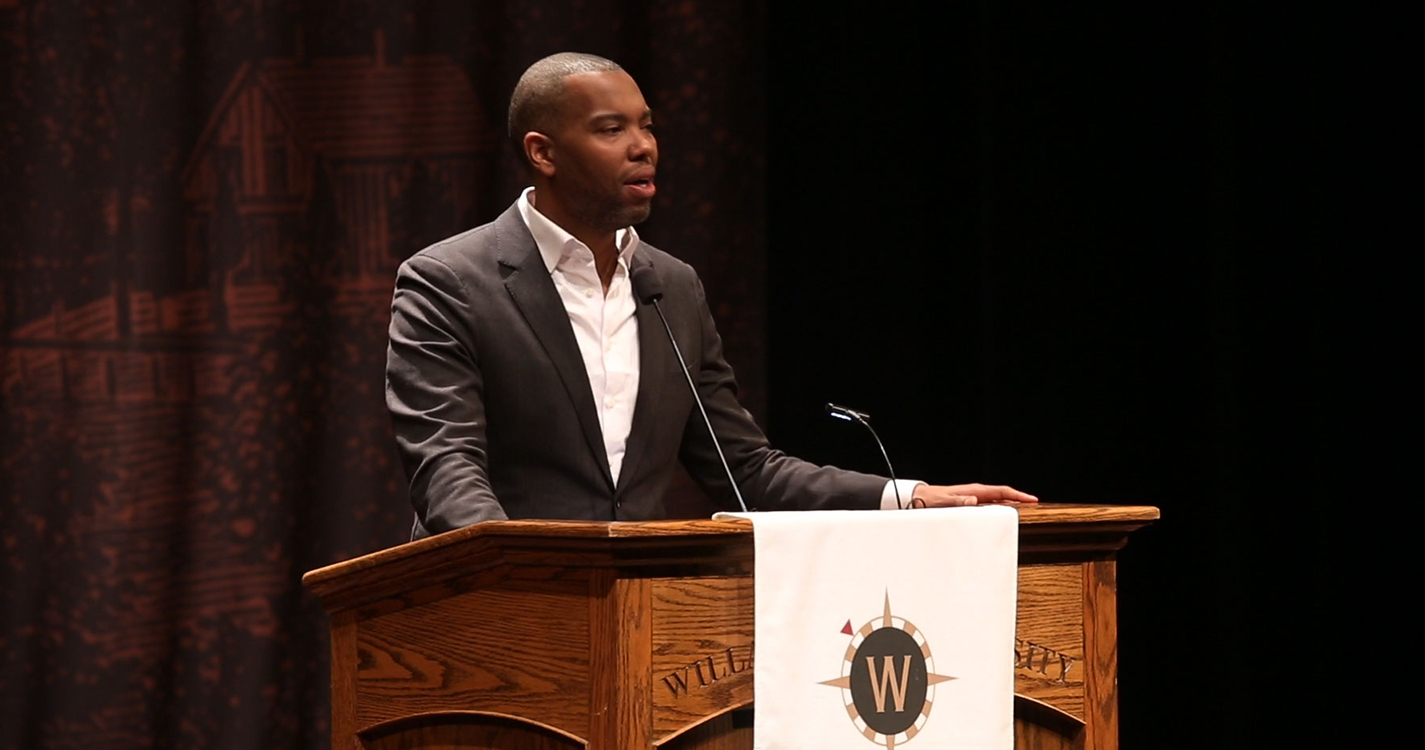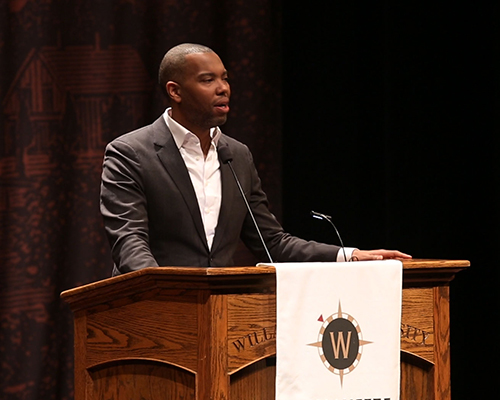“I’ve lived as a stranger.”
With those words, Ta-Nehisi Coates, a national correspondent for The Atlantic and author of the best-selling “Between the World and Me,” began a sweeping, thought-provoking lecture before a packed audience in Smith Auditorium.
He was responding to an Old Testament Bible verse quoted by Willamette President Steve Thorsett in his introduction: “You shall love the stranger, for you were a stranger in Egypt. Seek justice, love kindness.”
Coates, one of the nation’s most definitive voices on race relations, challenged the audience to think of race as an act — a moment-by-moment division we have created over centuries through our everyday language, the lies we tell ourselves and the efforts we make to cover up those untruths. He also indicated race is a false identifier, one shaped by early discriminatory laws that cemented wealth for whites and slavery for people of color.
“Race is the child of racism,” he said, “not the father.”
Coates’ talk, “A Deeper Black: Race in America,” was part of the university’s Atkinson Lecture Series, its annual Rev. Martin Luther King Jr. Celebration and the beginning of its year-long 175th anniversary commemoration. Current events made Coates’ presentation even more timely and significant.
Just a few days previously, President Donald Trump had signed an executive order banning travel to the U.S. by citizens from seven majority-Muslim nations. Coates said the president’s factually unsupported justification — that these nations send terrorists to the U.S. — is an example of lies that create race through acts of racism.
He also mentioned the lie told by Carolyn Bryant Donham, a white woman who in 1955 accused African-American teenager Emmett Till of making sexual advances toward her. The claim led to Till’s kidnapping and horrifying murder. Donham recently admitted what she said wasn’t true.
“It is the lies that we tell ourselves — it’s the lies that, at that point, we had spent over 300 years telling ourselves what race meant and what black men can do and what they will do,” Coates said. “And that voice was so powerful, that boy was tortured to death.”
Coates’ lecture provided a mini-history lesson and a reminder that early legislation against people of color ensured significant economic benefit to white people. With slavery a big business in the mid-1800s, investing in slaves meant growing your wealth. Coates referred to slave-owning as a “social institution” no different than people today aspiring to own a home.
“Homeowners are like a clique. They get together and they talk about what they’re going to do to their home,” he said. “Slavery was the same way. … How do you get more out of your slaves?”
Murmurs of agreement from the audience, which included Oregon Gov. Kate Brown, were heard throughout the lecture. Coates peppered his talk with humor and humility, managing to create the feel of an intimate conversation in the sprawling auditorium. As all tickets for the event were snapped up within hours, Willamette set up a live-stream feed to Hudson Hall, which accommodated another 500 students, staff, faculty and alumni.
At the end of Coates’s 30-minute talk, students asked several questions, including “How can one stop people from denying racism exists?” “How can one become an established writer?” “Why is Malcolm X your hero more than Martin Luther King, Jr.?” In answer to one question, Coates encouraged a nonviolent response to racism. He reminded the audience that revolutionaries who take up arms against the government always end up shooting each other.
To loud applause, he urged people to exercise their democratic rights. “Folks have got to get into the streets, they’ve got to vote,” he said. “They’ve got to run at the local level.”
He stressed that young people’s votes matter. And he pointed out that, while he didn’t fully support Hillary Clinton as a presidential candidate, life doesn’t always give us what we want.
“Sometimes,” he said, “it’s (a choice between) civilization or complete barbarism.”



